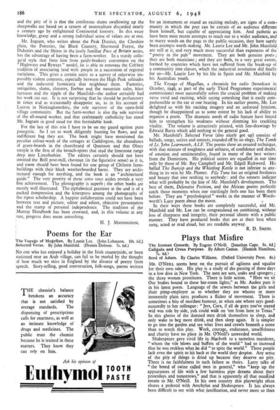Poems for the Ear
No one who has enjoyed a holiday in the Irish countryside, or been stationed near an Arab village, can fail to be moiled by the thought of how much we miss in England by the divorce of poetry from speech. Story-telling, good conversation, folk-songs, poems written
for an instrument or round an exciting melody, are signs of a com- munity in which the poet can be certain of an audience different from himself, but capable- of appreciating him. And pathetic as have been most recent attempts to reach out to a wider audience, and to marry words on the page to the public occasion, they have surely been attempts worth making. Mr. Laurie Lee and Mr. John Manifold. are still at it, and Nery much more successful than exponents of the " poetry in the pub " movement. They are both genuine poets ; they are both musicians ; and they are both, to a very great extent, formed by countries which have not suffered from the break-up of a community into classes, which the industrial revolution did finally for us—Mr. Laurie Lee by his life in Spain and Mr. Manifold by his Australian youth. The Voyage of Magellan, a chronicle for radio (broadcast' in October, 5946, as part of the early Third Programme experimental commissions) most successfully solves the crucial problem of making verse vivid and exciting, while saying something that is easily com- prehensible to the ear at one hearing. In his earlier poems, Mr. Lee delighted us with his exciting imagery' and an unforced lyricism, though he disappointed us to some extent by his lack of ability to organise a poem. The dramatic needs of radio feature have forced him to strengthen his weakness without dimming his crackling vitality. The volume is attractively printed, with line-drawings by Edward Burra which add nothing to the general good.
Mr. Manifold's 'Selected Verse (also nicely got up) consists of ballads, songs, satires and sonnets, rounded off by an elegy, The Tomb of Lt. John Learmonth, A.I.F. The poems show an assured technique, with that mixture of toughness and softness, of confidence and doubt, of emotion and sentimentality, found in many of the best writers from the Dominions. His political satires 'are equalled in our time only by those of Mr. Roy Campbell and Mr. Edgell Rickword. His ballad The Bunyip and the Whistling Kettle is not inferior to any- thing in its vein by Mr. Plomer. Fife Tune has an original freshness and beauty that owe nothing to anybody : and the sonnets indicate what will probably be the line of Mr. Manifold's development. The best of them, Defensive Position, and the African poems perfectly catch those moments when one startlingly feels one has been there before. They are " psychological " works in the manner of Words- worth's Lucy poem about the moon.
In their ways these books are completely successful, and Mr. Manifold and Mr. Lee can be congratulated on combining, without loss of sharpness and integrity, their personal idioms with a public manner. They have produced books that are at their best when sung, acted or read aloud, but are readable anyway. R. D. SMITH.


































 Previous page
Previous page